SCI Terms

Activity-based therapies: Interventions that target activation of the neuromuscular system below the level of the lesion, with the goal of retraining the nervous system to recover a specific motor task. This can be achieved through a variety of ways, for example, robotics, virtual reality, electrical stimulation, and repetitive movement training without the use of emerging technologies (e.g. treadmill or overground gait training).
Acute care: The emergency medical treatment that occurs immediately following a SCI. Following an injury, first responders ensure that the neck and spine are immobilized to prevent further damage. Once stabilized, scans are taken at the hospital to diagnose the exact location of the injury, and neurological examinations are performed to measure the extent of motor function and sensation.
ASIA Impairment Scale (AIS): The American Spinal Injury Association Impairment Scale is a multi-dimensional approach to categorizing motor and sensory impairment in individuals with SCI. The AIS describes a person’s functional impairment as a result of their SCI.
Autonomic dysreflexia: A sudden onset of excessively high blood pressure, common in people with SCI. For more information about autonomic dysreflexia, visit www.abcofad.jibc.ca
Complete injury: No sensory (ability to touch or feel) and/or motor function (ability to move) below the level of injury
Incomplete injury: Some sensory and/or motor function below the level of injury
Non-traumatic SCI: A SCI that occurs as a result of disease or birth defect.
Paraplegia: Complete or partial loss of sensory and/or motor function in the legs and in part of all of the trunk. It is caused by an injury to the thoracic (trunk).
Rehabilitation care: The process of learning how to navigate through life after SCI. Individuals will often see a team of care professionals including, but not limited to: physiatrists (rehabilitation doctors), physical therapists, occupational therapists, psychologists, rehabilitation counsellors and nursing staff.
Tetraplegia (quadriplegia): Complete or partial loss of sensory and/or motor function in the arms, and typically in the trunk and legs. It is caused by an injury to the neck.
Traumatic SCI: An SCI that occurs as a result of trauma such as a vehicle accident, fall, sports or violence.
Secondary complications: The range of conditions that can occur after the initial injury. Common conditions include pneumonia, urinary tract infections (UTIs) and pressure injuries (PIs).

